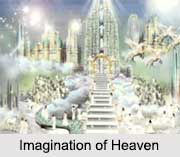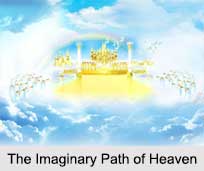 Heaven is generally construed as a place of happiness, sometimes eternal happiness. Heaven is seen as temporary feature in Hinduism and is considered important only until the next birth. The capital of heaven is "Aamaravati". The ruler of Heaven is believed to be Lord Indra and he interacts with many celestial beings (gandharvas).
Heaven is generally construed as a place of happiness, sometimes eternal happiness. Heaven is seen as temporary feature in Hinduism and is considered important only until the next birth. The capital of heaven is "Aamaravati". The ruler of Heaven is believed to be Lord Indra and he interacts with many celestial beings (gandharvas).
Myths of Heaven
Heaven is a place where mortals such as gods, angels, sages, etc. are said to live. According to the beliefs, heavenly beings can come down to earth or incarnate and material beings can come up to the heaven in the afterlife stage. It is often explained as a higher place or the holiest place in contrast to hell. Heaven is considered as "Swarga loka", and the soul is subjected to rebirth in different living forms according to its "karma". In the Vaishnava traditions, the highest heaven is "Vaikuntha". Entry into heaven or swarga loka or hell (Naraka) is decided by the Lord of death Yama and his Karmic accountant Chitragupta who records the good and bad deeds of a person during his lifetime. Entry into heaven is dependent on ones action in the previous life and is not restricted by faith or religion.
Lord Indra is the Lord of heaven. A variety of gods reside here. Celestial apsaras like Urvasi, Rambha perform dance here. To get to heaven, an individual must have accumulated high amounts of good "karma" and engaged in a lot of religious activities. Bhagavad Gita says "heaven and hell serve as provisional stations for the hibernating soul. The moment matching parents become available on Earth; the hibernating soul right away manifests a new body and starts a new cycle of life".
 As per the myths, heaven is filled with the Siddhas, the Vaiswas, the Gandharvas, the Apsaras, the Yama and the Dhamas. There are several heavenly gardens. The gentle wind of heaven is gentle and pleasing. The dwellers of heaven have magnificent bodies. Pleasant sounds fascinate both the ear and the mind. Garlands made from flowers are everlasting here. The dwellers of heaven are free from envy, grief, lack of knowledge and hatred.
As per the myths, heaven is filled with the Siddhas, the Vaiswas, the Gandharvas, the Apsaras, the Yama and the Dhamas. There are several heavenly gardens. The gentle wind of heaven is gentle and pleasing. The dwellers of heaven have magnificent bodies. Pleasant sounds fascinate both the ear and the mind. Garlands made from flowers are everlasting here. The dwellers of heaven are free from envy, grief, lack of knowledge and hatred.
Religious Description of Heaven
Following are the descriptions of heaven in different religions:
Hinduism: A Hindu account of heaven is somewhat similar to those in other religious explanations. In Hinduism, heaven consists of a number of kingdoms that have no distress. According to Hindu cosmology, above the earthly plane, are other planes like Bhuvar Loka, Svarga Loka, a heavenly paradise of bliss and some other planes are Bhu Loka, Suvar Loka, Satya-loka, Mahar Loka, Jana Loka, Tapa Loka, and Satya Loka, Atala Loka, Vitala Loka, Talatala Loka, Mahatala Loka, Rasatala Loka, Patala Loka.
Islam: The concept of heaven in the Quran changes in many respects to the concept in Judaism and Christianity. Heaven is explained chiefly in physical terms as a place where every wish is instantly fulfilled when asked. Islamic texts describe immortal life in Heaven as happy, without negative emotions.
Christianity: In Christianity, heaven is the place of the throne of God as well as the holy angels. It is the residence for the dead people in the afterlife, usually a provisional stage before the rebirth of the dead and the saints` return to the Earth.
Buddhism: In Buddhism, there are numerous Heavens. Those who gather good karma will reborn in one of them but their stay in heaven is not endless. In the end they will exercise their good karma and will undertake the rebirth into another land, as a human, animal or other being. Heaven is temporary and part of samsara (illusionary truth), Buddhists focus more on reaching enlightenment or nirvana.
Jainism: In Jainism, there is not one heavenly abode, but a number of layers for the appropriate souls of changing degree of karma. The "Deva Loka" heavens are at the figurative chest, where all souls experiencing the positive karma.
Heaven is inhabited by devatas, sages and several great and noble souls who performed good deeds upon earth and earned merit to qualify for their stay here.









